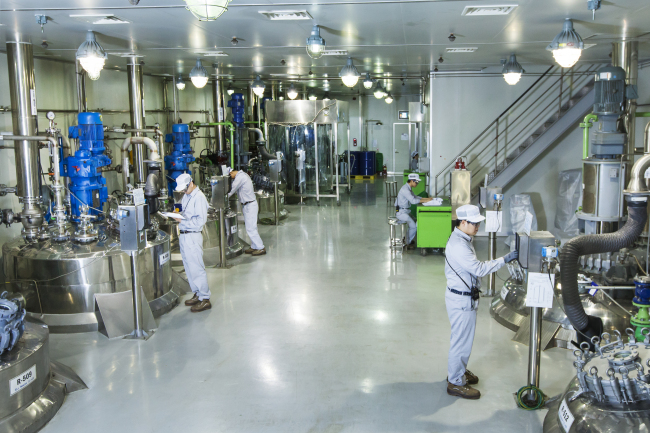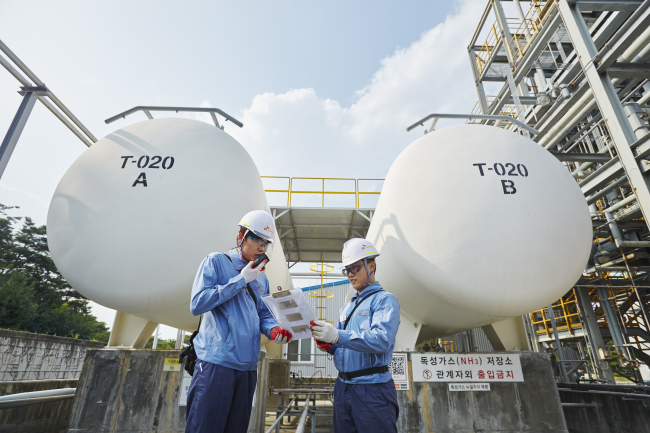[DECODED] SK pushes for new growth in chips, biopharmaceuticals, ICT, LNG
By Sohn Ji-youngPublished : Sept. 28, 2016 - 16:22
Faced with rising global competition and stagnant growth, SK Group, the country’s third-largest conglomerate has been searching for new, promising businesses to propel its continued growth in the long run.
In gaining a sense of where the energy-to-telecom giant is headed for in the future, industry watchers typically turn to SK Holdings — the group’s parent company that steers the direction of SK’s 88 affiliates and subsidiaries.
For now, SK Holdings’ vision for the group is five-pronged -- raising SK’s competitiveness in biopharmaceuticals, liquefied natural gas, materials for semiconductors, semiconductor modules and advanced information and communication technology.
In gaining a sense of where the energy-to-telecom giant is headed for in the future, industry watchers typically turn to SK Holdings — the group’s parent company that steers the direction of SK’s 88 affiliates and subsidiaries.
For now, SK Holdings’ vision for the group is five-pronged -- raising SK’s competitiveness in biopharmaceuticals, liquefied natural gas, materials for semiconductors, semiconductor modules and advanced information and communication technology.

In doing so, SK’s overarching body has been spearheading bold investment toward related SK units as well as pursuing strategic mergers and acquisitions to create new synergies with the group’s existing businesses.
Following last year’s merger between SK Holdings and the group’s ICT unit SK C&C, the revamped SK Holdings has been functioning as a business-driven entity rather than a simple holdings firm which merely sits and collects dividends from its subsidiaries.
“Our post-merger growth strategy is to not only nurture new businesses but also to raise corporate value through early investments in promising sectors,” SK Holdings told The Korea Herald.
Semiconductors
SK Holdings’ latest moves to drive forward its business expansion came with the high-profile acquisition of OCI Materials — since rebranded SK Materials — from Korean chemicals-maker OCI for 482 billion won ($440 million).
SK Materials is the world’s leading supplier of nitrogen trifluoride — a specialty chemical used as a chamber cleaning gas in manufacturing semiconductors, flat-panel displays and other electronic devices.

Through the acquisition, SK Holdings said it has now secured a stable supply of base materials and related technology which would synergize with its high-profit semiconductors business led by the group’s chipmaking unit SK hynix, the world’s second-largest memory chip manufacturer.
This year, SK Materials acquired SK Airgas and established SK Trichem as a joint venture with Japan-based Tri Chemical Laboratories to develop and produce a specialty electronics materials called “precursors” that ensure an even distribution of compounds in producing semiconductors.
“The semiconductors industry is a highly promising sector geared for a sharp growth ahead as markets for wearable devices and connected car technologies expand in the future,” SK Holdings said.
“While most local companies have been slow to act, SK has been swiftly working to raise its competitiveness in the global semiconductors market (with strategic acquisitions),” it said, citing plans to push for additional M&As.
Biopharmaceuticals
SK Holdings has been leading the group’s renewed push into biopharmaceuticals as well. In February this year, it acquired 100 percent of SK Biotek, a contract manufacturer of active pharmaceutical ingredients used to produce chemical drugs.
Prior to the acquisition, SK Biotek had been owned by SK Biopharmaceuticals, a directly controlled subsidiary of SK Holdings that focuses on new drug development.
Under the streamlined ownership structure, SK Holdings now directly controls SK Biotek in addition to SK Biopharmaceuticals -- reflecting the group’s “active will to ramp up its pharmaceutical business and become an early leader in the segment.”
SK Biotek, which currently manufactures pharmaceutical API for clients such as Novartis, Pfizer and Astrazeneca, is looking to significantly expand its business scale and production capabilities.
The SK-owned pharma CMO is working to build a new production plant in Sejong City, which upon its completion in 2020 will drive up its net drug manufacturing capacity from 160,000 liters to 800,000 liters.
It is also reviewing potential acquisitions to expand its business beyond manufacturing API to producing finished drugs developed by pharma companies, the company said.
“Starting with surpassing the 100 billion won mark in revenue this year, SK Biotek is looking to drive up its revenue to more than 1.5 trillion won by 2020,” SK Holdings stated.
Meanwhile, SK Biopharmaceuticals is pinning high hopes on its self-developed epilepsy treatment YKP3089, which scored rare permission from the US Food and Drug Administration to skip the efficacy testing stage in its forthcoming phase III clinical trials in the US, cutting down on related costs and the testing period.
The firm plans to submit its drug to the FDA for sales approval next year, with aims to commercialize the drug in the US by 2018. It is also planning an initial public offering after the drug launches, SK Holdings said.
Next-generation ICT
At the same time, ICT solutions firm SK Holdings C&C, which operates as an independent entity within the merged SK Holdings, is looking to build new businesses utilizing next-generation technologies including artificial intelligence, cloud computing and big data.
In partnership with US tech firm IBM, SK’s ICT solutions unit has been preparing to offer services -- such as banking, telecommunications, logistics and health care -- running on IBM’s artificial intelligence program Watson.
With aims to make headway in the still-fledgling domestic market for AI, big data and cloud computing, SK opened a cloud data center here with IBM in August. It also rolled out its self-developed cloud service Cloud Z and Watson-based AI service Aibril.
Just this month, Aibril was deployed at a number of places to boost productivity — including SK hynix’s manufacturing plants and the Gachon University Gil Medical Center which has become the first Korean medical institute to utilize AI for examining and treating cancer patients.
Meanwhile, SK Holdings C&C has also embarked on the “smart factory” business. Smart factories refer to highly automated, IT-driven plants that have been optimized to maximize output.
In January this year, SK began a project to transform the printer production lines of electronics firm Foxconn in Chongqing, China, equipping them with automated assembly systems. SK plans to partner up with more Korean and Chinese manufacturers in the semiconductor, display and automotive sectors to deploy smart systems at their production lines.
Globalizing LNG business
On the energy front, SK Group is looking to bolster is global competitiveness in the LNG production and city gas business led by SK E&S — the only Korean company to possess full-on capabilities in the LNG supply chain.
SK E&S possesses capabilities in the upstream — extracting natural gas from gas fields; the midstream — liquefying and storing natural gas; and the downstream — supplying the gas and electricity to the city.
In strengthening its capabilities in the segment, SK Holdings said it has been working with state-run Chinese electricity providers to build a new LNG terminal — a facility for re-gasifying the LNG shipped in from the production zones for use as an energy source — in China.
SK is also preparing to construct new midstream and downstream facilities within China, to expand its LNG business to additional markets beyond Korea. In doing so, SK E&S expects to double its overseas revenue to 8.2 trillion won, from 4.65 trillion won posted in 2015.
By Sohn Ji-young (jys@heraldcorp.com)



![[Exclusive] Korean military set to ban iPhones over 'security' concerns](http://res.heraldm.com/phpwas/restmb_idxmake.php?idx=644&simg=/content/image/2024/04/23/20240423050599_0.jpg&u=20240423183955)

![[Graphic News] 77% of young Koreans still financially dependent](http://res.heraldm.com/phpwas/restmb_idxmake.php?idx=644&simg=/content/image/2024/04/22/20240422050762_0.gif&u=)



![[Pressure points] Leggings in public: Fashion statement or social faux pas?](http://res.heraldm.com/phpwas/restmb_idxmake.php?idx=644&simg=/content/image/2024/04/23/20240423050669_0.jpg&u=)









